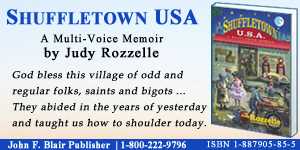Ever since the immigrant Scotch-Irish set foot upon the ports of this grand country we have been studied and dissected like biology frogs. Okay, I am exaggerating. But it is not an exaggeration to say that the Scotch-Irish personality is an enigma to many. One fact that is assumed about southern folks is that we love a good fight and a good celebration. It has even been said that we will fight at the drop of a hat. Our cultural history verifies this.
I cannot resist throwing my two cents into the pile of books and columns that have been published explaining the mind of the south. After all, I am a storyteller and a spinner of yarns. My roots run deep into the Carolina red clay.
The anniversary of the Revolutionary war battle of Ramseur’s Mill is approaching. On June 20, 1780, 1,300 Tories and approximately 400 Patriots converged on a hilltop near Moses Ramseur’s Mill and commenced a battle fought to the death. Neither the Tories nor the Patriots were well armed. To understand this battle it is important to note that this was a battle fought by neighbor against neighbor, brother against brother, cousins against cousins. It was a civil war.
In the Carolina back country there was nothing less than civil unrest. On a daily basis allegiances were sworn to the British, but those who sworn allegiances to the British were as likely to change their mind when they spoke with a Patriot.
Civil war is a staple in our history. It begins in the foggy pages of civilization. Our heritage is traced back to the Lowland Scots who left the scant thin soil of Scotland to follow the promise of bountiful harvest on the Ulster Plantation in Northern Ireland. They left behind a lawless poverty stricken land to return to Ireland.
To understand how it came that the Revolutionary War was fought with such zeal by the Scotch Irish…let’s open the biology drawer and take out the proverbial ‘frog,’ and place it, once again, under the microscope to study our DNA.
In discussing the Scotch-Irish it is impossible to separate fact from legend and myth. Let’s begin with myth. Before the Iron Age, in the time of the long before, a Celtic race of people known as the Picts lived on the northern edge of Ireland. When Moses was parting the Red Sea, it is told that their leader know only as Neill, the grandson of Gaodhal Glas, married the daughter of an Egyptian Pharaoh. This ancient warrior queen was known as Scotia and her sons became the Scoti. During this time, the Scoti migrated from Ireland to Scotland seeking a better life and refuge from the Romans. If you are keeping score this migration took place during the fifth century. The truth of who they were slumbers in the lost page of history far beyond our reach.
The roots of the Ulster Scots who migrated to America lie in Scotland and the fire in our blood is inherited from the wild people who battled the Romans. They were guerilla warriors and farmers.
The Scoti evolved into the primitive Caledonians or the Caledonian Confederacy as they are known to scholars. They became the indigenous Iron Age people of Scotland. And it all began with an ancient queen from Egypt.
The Romans labeled them as barbarians and savages. Yet, Celtic royalty was descended through the mother. Let’s put it this way, these barbarians figured you always knew who your mother was, if not your father. This was pretty good reasoning for Barbarians.
The people of Scotland and Ireland were skilled in the making of bronze and iron weapons. They were not a unified nation. They were horse-war tribes down through the annals of history who often fought each other.
Hadrian’s Wall was originally built as a defense against attacks by the wild hordes of the primitive people of Ireland and Scotland. They lived in hill forts and farmed. In Scotland, their life continued to be one of battle and hardship. The Romans were never able to completely conquer these people.
It is still written and accepted that the Scoti, the Caledonians, the Celtic tribes were barbarians and savages. However, in 1850, a mighty storm on the Orkney Islands in the north of Scotland removed tons of sand from a stretch of beach and uncovered an Iron Age Neolithic site, a village called Scara Brae that was established 3,000 years before the Romans invasion of Scotland. The village was a gathering of stone houses with indoor water storage, indoor toilets, and underground drainage systems. Scientists believe they studied astronomy and sailed as far away as the Middle East. It was an advanced civilization. During the Stone Age, the village of Scara Brae supposedly a place inhabited by savages and barbarians was flourishing.
It was their descendants who migrated back to the Ulster Plantation in Northern Ireland. We know of the strife and war that gripped Ulster during the mid-1600s until today. In Ulster they found more starvation, taxation, and siege. In the sieges of the town of Derry, the Kings of England and France starved equally the native Irish and the Scottish. It was the peasant farmer who suffered and it was the Ulster immigrants who set sail across a dangerous sea in crowded ships exposing themselves to illness and starvation. The peasants came to the shores of America with empty pockets filled only with the hope of improving their lot in life.
We were the lowest of the British class system and it is in our heritage that we were always on the move and always at war with some one, if not ourselves.
It was the children of these peasants who met on June 20, 1780, to wage a harsh and gory battle of neighbor against neighbor. Few wore a uniform. The only way they could separate friend from foe was a white piece of cloth the Patriots wore in their hats.
Consider this, a conversation I found at an Internet Site, The American Revolution in North Carolina, The Battle of Ramseur’s Mill.
In the thickest of the fight a Dutch Tory, seeing an acquaintance, said, “How do you do, Billy? I have knowed you since you was a little boy, and never knew no harm of you except that you are a Patriot.â€
Billy, who was out for business and not to renew acquaintance, as his gun was empty, made a pass at his friend’s head with the butt of his gun, who dodged and said:
“Stop! Stop! I am not going to stand still and be killed like a damn fool, needer,†and immediately made a lick at Billy’s head, which he dodged. A friend of Billy whose gun was loaded put it to the Dutchman’s side and shot him dead.â€
Hard times make hard people.


